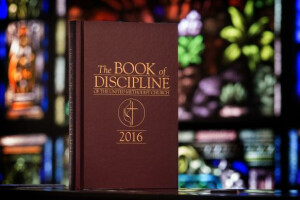A Message on Disaffiliation From the Baltimore-Washington Conference Board of Trustees

December 4, 2019
In February 2019, General Conference voted to create a new paragraph in the Book of Discipline (¶ 2553). This paragraph was intended to give individual local congregations a time-limited opportunity to "disaffiliate" from The United Methodist Church for reasons of conscience based on decisions made by the General Conference or their annual conference concerning the full inclusion of LGBTQIA+ persons in the life of the church.
The General Conference provided that all disaffiliation agreements between congregations and their annual conference must include certain "standard terms" that were spelled out in ¶2553, but it also authorized annual conference trustees -- working with advice from the Cabinet, the conference treasurer, the conference benefits officer, the director of connectional ministries, and the conference chancellor -- to establish additional terms and conditions for disaffiliation agreements, provided that none of the additional terms were inconsistent with the minimum standards required by ¶2553.
The Trustees of the Baltimore-Washington Conference commenced their work on developing disaffiliation procedures this past summer, but suspended that work in mid-August as a result of the Commission on the General Conference's announcement, on August 20, 2019, that a preliminary vote that led to the enactment of ¶ 2553 was void based on voting irregularities. Specifically, the Commission determined that persons who lacked proper credentials were among those that voted. In light of that ruling, the trustees of the Baltimore-Washington Conference concluded that their authority to develop disaffiliation procedures had been nullified. In addition, the trustees were mindful that the disaffiliation landscape would be subject to further change, given that the Judicial Council was expected to making their ruling on the voting irregularity issue during its Fall Session, and because the 2020 General Conference would undoubtedly be presented with multiple, distinct legislative petitions concerning congregational disaffiliation.
Although the Judicial Council completed its Fall Session earlier this month, the validity of ¶ 2553 remains too uncertain to allow the Conference trustees to complete their work on disaffiliation procedures. In fact, on November 1, 2019, the Judicial Council announced in Decision No. 1386 that it was rescheduling the case involving voting irregularities for resolution during the Council's Spring Session, which convenes on April 29, 2020, in Minneapolis, just before the start of the 2020 General Conference.
In other words, it remains the case that the legislation that authorizes annual conference trustees to establish disaffiliation terms and conditions has been determined to be void; that the Judicial Council has not yet reviewed that determination; and regardless of the outcome of the Judicial Council's review during its Spring Session, the 2020 General Conference will be convening the very next week, at which point it will be considering yet another array of legislative petitions addressing the issue of local church disaffiliation.
Since there has been no material change in the status quo, the Conference's Board of Trustees has reaffirmed its decision to defer the establishment of disaffiliation procedures for use in the Baltimore-Washington Conference. We do not expect to complete our work on that front until late May 2020 at the earliest, after the Judicial Council issues a definitive ruling and the General Conference completes its work in Minneapolis. Even then, the trustees could only resume work on disaffiliation procedures if ¶ 2553 is fully reinstated, or if some other new action gives the Conference Trustees a disciplinary authority to engage in that work. That said, as soon as the draft legislation is published, the Conference trustees will review the disaffiliation petitions that are slated to be presented to the General Conference in May 2020, seeking to identify in advance how each legislative approach addresses the issue and which procedures seem best suited to implementing that approach in the Baltimore-Washington Conference should it be approved by the General Conference.
In the meantime, the trustees' continued prayer and expectation is each congregation in the Baltimore-Washington Conference will continue to regard itself as local churches are defined in ¶201 of the Discipline -- as "'a connectional society of persons' who, having 'assumed the vows of membership in The United Methodist Church,' have dedicated themselves to 'carry forward the work that Christ has committed to his church . . . within The United Methodist Church and subject to its Discipline.'"
The Board of Trustees of the Baltimore-Washington Conference
John Strawbridge, Chair

This statement is highly misleading! According to a November 1, 2019, UM News article, the exit plan provision (¶ 2553) was enacted at the end of the 2019 General Conference and this was confirmed by the Judicial Council during their Fall session. Just because the Commission on the General Conference opined that the provision is void does not make it so. Unless or until there is a new ruling by the Judicial Council or a change by the General Conference, ¶2553 is in effect. The Board of Trustees statement should be revised to accurately portray the status of ¶2553.
This is a political move to force churches to stay and those wishing to leave lose their property. The Judicial council said it is already in effect and passed and that the COB had no basis or evidence for their challenge to it. Disgraceful.